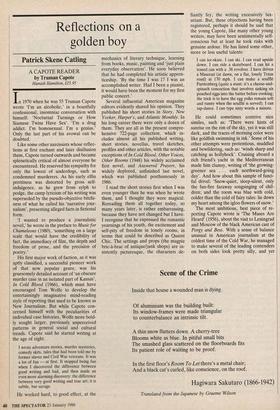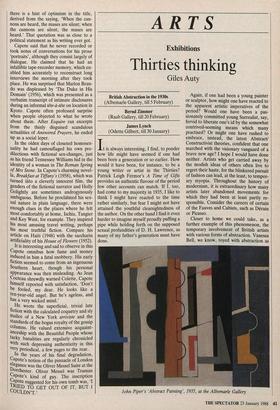Reflections on a golden boy
Patrick Skene Catling
A CAPOTE READER by Truman Capote Hamish Hamilton, £15.95 In 1970 when he was 55 Truman Capote wrote 'I'm an alcoholic,' in a boastfully confessional, insomniac conversation with himself: 'Nocturnal Turnings or How Siamese Twins Have Sex'. 'I'm a drug addict. I'm homosexual. I'm a genius.' Only the last part of his avowal can be doubted.
Like some other narcissists whose reflec- tions at first enchant and later disillusion them, Capote turned outwards and became splenetically critical of almost everyone he encountered. He reserved his sympathy for only the lowest of underdogs, such as condemned murderers. As his early elfin prettiness was distorted by gross self- indulgence, as he grew from sylph to podge, the camp lyricism of his writing was superseded by the pseudo-objective bitchi- ness of what he called his 'narrative jour- nalism', presenting alleged facts in fictional form.
`I wanted to produce a journalistic novel,' he wrote in the preface to Music for Chameleons (1980), 'something on a large scale that would have the credibility of fact, the immediacy of film, the depth and freedom of prose, and the precision of poetry.'
His first major work of faction, as it was • aptly classified, a successful pioneer work of that now popular genre, was his gruesomely detailed account of 'an obscure murder case in an isolated part of Kansas', In Cold Blood (1966), which must have encouraged Tom Wolfe to develop the entertainingly imaginative mind-reading style of reporting that used to be known as New Journalism. But while Capote con- cerned himself with the peculiarities of individual case histories, Wolfe more bold- ly sought larger, previously unperceived patterns in general social and cultural trends. Capote said he started writing at the age of eight.
I wrote adventure stories, murder mysteries, comedy skits, tales that had been told me by former slaves and Civil War veterans. It was a lot of fun — at first. It stopped being fun when I discovered the difference between good writing and bad, and then made an even more alarming discovery: the difference between very good writing and true art; it is subtle, but savage.
He worked hard, to good effect, at the mechanics of literary technique, learning from books, music, painting and 'just plain everyday observation'. He soon believed that he had completed his artistic appren- ticeship. `By the time I was 17 I was an accomplished writer. Had I been a pianist, It would have been the moment for my first public concert.'
Several influential American magazine editors evidently shared his opinion. They published his short stories in Story, New Yorker, Harper's, and Atlantic Monthly. In his long career there were only a dozen of them. They are all in the present compre- hensive 722-page collection, which in- cludes almost all his published writing, short stories, novellas, travel sketches, profiles and other articles, with the notable exceptions of In Cold Blood, Other Voices, Other Rooms (1948) his widely acclaimed first novel, and Answered Prayers, his widely deplored, unfinished last novel, which was published posthumously in 1986.
I read the short stories first when I was even younger than he was when he wrote them, and I thought they were magical. Rereading them all together today, so many years later, is rather embarrassing, because they have not changed but I have. I recognise that he expressed the romantic yearnings of his youth, the excitement and self-pity of freedom in lonely rooms, in terms that could be described as Quaint Chic. The settings and props (the magpie bric-a-brac of antique/junk shops) are in- sistently picturesque, the characters de- fiantly fey, the writing excessively lux- uriant. But, these objections having been registered, perhaps it should be said that the young Capote, like many other young writers, may have been sentimentally self- conscious but at least he took risks with genuine ardour. He has listed some other, more or less useful talents: I can ice-skate. I can ski. I can read upside down. I can ride a skateboard. I can hit a tossed can with a .38 revolver. I have driven a Maserati (at dawn, on a flat, lonely Texas road) at 170 mph. I can make a souffle Furstenberg (quite a stunt: it's a cheese-and- spinach concoction that involves sinking six poached eggs into the batter before cooking; the trick is to have the egg yolks remain soft and runny when the souffle is served). I can tap-dance. I can type sixty words a minute.
He could sometimes contrive nice similes, such as: 'There were hints of sunrise on the rim of the sky, yet it was still dark, and the traces of morning color were like goldfish swimming in ink.' Some of his other attempts were pretentious, muddled and bewildering, such as: 'winds sharp and catching as hollyhock'. Cruising aboard a rich friend's yacht in the Mediterranean made him clumsy, writing of 'the growing- greener sea . . . each northward-going day'. And how about this sample of fanci- ful drivel: 'Snow-quiet, sleep-silent, only the fun-fire faraway songsinging of chil- dren; and the room was blue with cold, colder than the cold of fairy tales: lie down my heart among the igloo flowers of snow.'
The most ambitious, best piece of re- porting Capote wrote is 'The Muses Are Heard' (1956), about the visit to Leningrad and Moscow of the black American cast of Porgy and Bess. With a sense of balance unusual in American journalism at the coldest time of the Cold War, he managed to make several of the leading contenders on both sides look pretty silly, and yet there is a hint of optimism in the title, derived from the saying, 'When the can- nons are heard, the muses are silent; when the cannons are silent, the muses are heard.' That quotation was as close to a political statement as his writing ever got.
Capote said that he never recorded or took notes of conversations for his prose `portraits', although they consist largely of dialogue. He claimed that he had an infallible tape-recorder memory, which en- abled him accurately to reconstruct long interviews the morning after they took place. He was surprised that Marlon Bran- do was displeased by 'The Duke in His Domain' (1956), which was presented as a verbatim transcript of intimate disclosures during an informal tete-a-tete on location in Kyoto. Capote often professed surprise when people objected to what he wrote about them. After Esquire ran excerpts from the thinly disguised scandalous actualities of Answered Prayers, he ended up as a social leper.
In the olden days of closeted homosex- uality he had camouflaged his own pre- dilections with fictional sex-changes, just as his friend Tennessee Williams hid in the identity of a woman in The Roman Spring of Mrs Stone. In Capote's charming novel- la, Breakfast at Tiffany's (1958), which was turned into a cleverly innocent film, the genders of the fictional narrator and Holly Golightly are sometimes androgynously ambiguous. Before he proclaimed his sex- ual nature in plain language, there were enough clues in the places where he felt most comfortably at home, Ischia, Tangier and Key West, for example. They inspired his most amusing travel writing, perhaps his most truthful fiction. Compare his article on Haiti (1948) with the saccharin artificiality of his House of Flowers (1952). It is interesting and sad to observe in this Capote omnibus how fame and money induced in him a fatal snobbery. His early fiction seemed to come from an ingenuous Southern heart, though his personal appearance was then misleading. As Jean Cocteau shrewdly warned Colette, Capote himself reported with satisfaction, 'Don't be fooled, my dear. He looks like a ten-year-old angel. But he's ageless, and has a very wicked mind.' He wrote the superficial, trivial late fiction with the calculated coquetry and sly malice of a New York arriviste and the standards of the bogus royalty of the gossip columns. He valued extensive acquaint- anceship with the Beautiful People whose tacky banalities are regularly chronicled with such depressing authenticity in this very periodical, a few pages to the rear. In the years of his final degradation, Capote's notion of the pinnacle of London elegance was the Oliver Messel Suite at the Dorchester. Oliver Messel was Truman Capote's kind of guy. The inscription Capote suggested for his own tomb was, 'I TRIED TO GET OUT OF IT, BUT I COULDN'T.'



























































 Previous page
Previous page